The I-5 Killer Read online
Page 2
In shock over a bestial act she could not understand, and gagging, Merrisue wiped her face and mouth with a towel. She thought that the man was probably going to shoot them. He toyed with the gun while the little girls cringed against the tub. Merrisue prayed that it was only a toy gun. After a long time the man told them to get dressed and that they must stay in the bathroom. If they came out, something bad would happen to them. They clung together, afraid that he was still someplace in the house.
At ten minutes after six their mother came home. Despite the January chill, the front door was standing wide open. Alarmed, she walked into the kitchen and saw that the phone was off the hook. When she tried to replace the receiver, she couldn't find it. It wasn't anyplace in the room.
She called for her children, and heard Merrisue answer from the bathroom, "Can we come out now?"
Running toward the bathroom, she met her daughters.
"There's a burglar in the house," Merrisue gasped. "I think he's still here."
Mrs. Green didn't stop to look around; she grabbed her children and ran for a neighbor's house, where she called the Corvallis police.
Merrisue and Megan made excellent witnesses; they had memorized everything they could about their attacker. They'd seen the "San Francisco" label on his blue jeans, the white X's on the back.
"He had a beard — a funny beard," Merrisue told detectives. "I don't think it was real. I don't think the gun was real, either. I think it was a toy gun. He was going to shoot us, but he couldn't."
It had not been a toy gun, of course. It was a real gun.
The Corvallis attack outraged lawmen. Taboos as old as civilization had been broken. Initially the perversions against the Green children seemed to have no connection to the fast-food robberies. Even sexual psychopaths have "rules." It is rare indeed for men who attack mature females to violate children or for pedophiles to seek out adult women as victims. When a sexual criminal moves outside his victim pattern, it is an indication that he is in the grip of almost maniacal frenzy.
He was a murder looking for a place to happen.
And, still, the man with the silver gun retained his anonymity. He was very clever. He knew the value of moving on before investigators could link him to a series of crimes. He knew the limitations of their teletype networks.
CHAPTER 1
Salem, Oregon, January 18, 1981, 21:45 hours.
The big man ran fluidly and easily, an athlete's effortless movement. Through the dark streets he ran, turning here, turning again, leaving the bleeding women behind him. The adrenaline he'd always felt on the playing field when the pressure was on coursed full strength through his blood, making him feel as though he could run ten miles, twenty miles, without stopping. He could do anything!
He had done it; he had orchestrated the whole scene to his own plan. He had found the girls there, just as if they were waiting for him, and he had made them do all the things he liked. He had humbled them, and toyed with them, and finally he had destroyed them. He felt as if he were the most powerful male who had ever lived; he was consumed with his own power. No woman would ever, ever control him again.
The streets were so quiet, as quiet as death itself. No one had seen him. No one would ever know that he had been the one.
It was cold, but he was perspiring, just the way he always did in sports. This was a kind of sport, if you looked at it from the proper perspective. Stalking the women, finding them, and then being so strong and confident that they obeyed his orders.
But this game had been the best game so far; this was the first time he had killed women simply because they were female. Strangers. Nobodies. If they weren't dead by now, they soon would be.
They wouldn't tell on him the way girls always tattled. They could only lie there in pools of their own blood, silenced … punished.
He allowed himself to stop running. He walked easily now, pulling his hood closer around his face. He felt invisible. He didn't even need to look away from the headlights that were bearing down on him. He was invisible.
Salem, Oregon, January 18, 1981,21:54 hours.
Salem Fire and Ambulance Dispatch Hot Line: 911.
Zena Harp and Dave Cameron were working the late-evening shift on this black, moonless Sunday. A quiet night; there was time to talk, time to complain desultorily about the weather — as if the threat of rain were not the expected, accepted condition for January in Oregon. And yet, they were not bored. No one is ever bored while manning an emergency hot line. The next call — or the one after that — may signal catastrophe.
Now, just six minutes before ten P.M., the phone brrr-ed, its red bubble light blinking frantically. Zena Harp reached for the receiver, and Dave Cameron picked up another to monitor the call.
And, instantly, each of them tensed. This was not a routine call; this was trouble. They heard a woman's voice, a faint voice, full of pain and terror.
"We've been shot … please help us!"
Zena Harp kept her own voice calm; she had to find out location, specifics, before she could send help. "Where are you?"
There was a long pause, so long that Ms. Harp thought the caller had gone off the line. And then the voice came again, more faint, if possible, than it had been before. "… River Road … or Commercial Street."
"What address?"
" … near the Fun Machine."
Dave Cameron had heard enough; he knew where the Fun Machine was — on the outskirts of Salem near Keizer — and he could pinpoint the location enough to dial the telephone operator and ask for an emergency trace. Within moments the operator reported that the call was coming in from the TransAmerica Title Building.
Now Cameron reacted almost automatically, asking the operator to patch the call into the Salem Police Department's Communications Center. And then he dispatched paramedics from the Keizer Fire Department and an ambulance to the building where the woman waited.
While this was being done, Zena Harp talked to the terrified woman.
"Please hurry," the girl begged. "He's gonna come back and kill me. I think she's dead…."
"Do you want me to stay on the line?" Ms. Harp soothed. "An ambulance is on the way."
The girl on the other end was drifting away. Her voice was thready, and her answers weren't responsive. "Oh … oh, I think she's dead."
The patch had been made within a matter of a few minutes. Zena Harp handed the caller over to the Salem Police dispatcher.
Liz Cameron, the Com Center operator for the Salem Police Department, spoke to the woman in the TransAmerica Title Building. There was no time now to speculate on why anyone would be in the office building late on a Sunday evening. Liz knew that an ambulance and Marion County Sheriff's squad cars were on the way. She had to find out as much as she could. If the gunman was still in the building, the officers had to be warned.
"Ma'am," Liz Cameron began, "what is your name?"
"Beth Wilmot. I've been shot in the head. Hurry!"
"We have an ambulance on the way. Who shot you?"
"Some man … I don't know … with a gun."
"Okay."
"We were cleaning the office, and he came in."
"Okay. We have somebody on the way. Can you tell me what he looked like at all?"
"Ah … Oh, my God. He had dark brown hair."
"Dark brown hair."
"And he had … he had a Band-Aid on his nose."
"Okay. Was he a white man?"
"Yes."
"About how old would you say he is?"
"Oh, I don't know. Around twenty-seven."
"Okay, and how tall?"
"Oh, I … ah, five ah nine, six foot, I don't know. Something like that. Five-nine, a little over the average size of a — "
"Do you remember what he was wearing?"
To a layman, Cameron's questions might seem harsh, but she was sending policemen into an area where they might well be perfect targets. They had to know who their enemy was. The woman on the phone sounded weak but rational. Later, Liz
Cameron would marvel at the victim's ability to respond — later, when she learned the extent of the girl's injuries.
Do you remember what he was wearing?" Liz Cameron probed.
"Oh … ah … ah … a coat … ah."
"A coat."
"Ah … leather coat, or something."
"A leather coat."
"And a pair of cheap jeans."
"And jeans. Okay, you stay right on this phone with me. We have several people on the way."
"I'll wait."
"And we have an ambulance coming too."
"Could I just give you a number so you … so I could call home, please, just call them …"
"I'd like to keep you on the line, if I could, until a deputy arrives and makes sure you are all right."
"Oh, my head … Hurry. It hurts."
There was another long pause. Liz wondered if Beth had lost consciousness, and then her voice came again, pleading for help.
"I hurt … I hear the ambulance."
"Just a minute more."
"Poor Shari is going to die."
"The lady who was shot?" The police dispatcher thought that Beth was talking about her own injuries. The whole conversation was garbled — the frantic girl on the phone, and Liz Cameron trying to keep a lid on the hysteria she could hear bubbling up.
"She is going to die. We didn't do anything."
"Okay. The ambulance should be there anytime."
"Talk to me," the girl pleaded. "So you'll make me feel better, please."
"Okay. I'll talk to you, Beth. How do you feel now? Any better?"
"… ah … ah, a little better."
"Okay. You just calm down. There's going to be somebody there shortly. Is there anyone else there with —?"
"I should go home now, but I hurt."
"Is there anybody else there with you?"
"Yes, my girlfriend."
"Okay, what's your girlfriend's name?"
"Shari Hull."
"Is she waiting for the ambulance to let them in?"
"It's open. The door's open."
"Okay. Which way did the man go when he left? Did you see?"
"I don't know — my head was down. I was on the ground when he shot us. He told us to put our heads down."
"Okay. Well, we have somebody almost there. We are going to let them talk to you … and is your friend there? I could talk to her too."
"Oh," the girl cried, "I don't know what happened. She's on the ground. Please don't talk to her. She's … I think … almost dead."
"Did he shoot her?" Liz Cameron had thus far thought that Beth Wilmot was the only victim — that Beth's friend was waiting to signal in the deputies and the ambulance. Now the situation sounded even more desperate than it had first appeared.
"Yes."
"He shot —"
"He shot five times," the girl blurted.
"He shot her as well?"
"Yes. Yes, three times. I can hear her breathing really hard. I'm afraid he's going to come back. Please hurry!"
"Okay. We have people on the way. Okay, have you ever seen him before? Did he leave in a vehicle — you know — a car?"
"I don't know. Her truck is running though."
"Her truck is running?"
"Yes."
"Okay. What kind of a truck does she have?"
"She has a Bronco."
"A Bronco."
"A green Bronco 'cause we had it running 'cause we were about to leave."
"Okay. Which room are you in there? Is there … is it —?"
"It's just a little office."
"Okay, just a minute, Beth. Okay. We have somebody who will be there real shortly. You keep talking to me. Can you give me your home phone number in case we need that?"
"555-5411. It's an answering service, but nobody is home and they will … Oh! Somebody is here."
"Okay. Somebody there now?"
"The ambulance. Can I hang up now?"
"Okay. You see the ambulance?"
"Yes."
"Okay, you go over to the ambulance now."
"Bye-bye," the girl named Beth whispered.
CHAPTER 2
The TransAmerica Title Building — from which the frantic call for help had come — was only one of several in the business complex on River Road, the area just beyond Salem's city limits. The complex was new construction, solid modern buildings and businesses separated by parking areas. On a weekday, the region would have been full of people, but on this gloomy black Sunday, the entire complex seemed hollow and deserted. Even the eating establishments nearby were closed; their customers were home for the weekend.
Indeed, aside from the two girls who were in the TransAmerica Building, only a handful of people were in the entire complex.
Two women worked in the back room of the Celebrations Designs bridal shop almost directly across the parking lot from the entrance to the TransAmerica offices. Dorothy Hall, the owner of the custom-bridal-gown shop, had had no choice that afternoon; she had promised to have a bridal gown and bridesmaids' dresses finished in time for a wedding. She had worked in the sewing room of her shop since late afternoon, stitching beading, lace, yards and yards of delicate wedding finery. One of her seamstresses, Bev Johnson, worked with her, and Mrs. Hall's daughter, Patrice Walters, had promised to come in later to help.
Mrs. Hall had felt a little uneasy all afternoon. She'd commented to Ms. Johnson how lonely and almost "spooky" the mall seemed when its weekday inhabitants were gone; it seemed a modern ghost town, all concrete and walls of black windows that only occasionally reflected headlights of the few cars that passed by. She regretted that she had asked her daughter to come down in the evening to work alone. Even though her shop locked up tightly, she worried.
Time had passed rapidly throughout the afternoon and into the evening, and Mrs. Hall was surprised when her daughter arrived and announced that it was a quarter after nine. The gowns were almost finished, and Patrice said she would stay and put on the finishing touches. The three women chatted for a few minutes, and Mrs. Hall heard the nine-thirty news broadcast come on the little radio in the back room. She looked at the clock then to confirm the time, and left with her seamstress, but only after warning Patrice again to be sure that she kept the doors locked and the lights out in the showroom facing the mall.
"Don't advertise that anybody's in here," she told her daughter. "Just stay back in the sewing room, and don't stay late."
Dorothy Hall was exhausted and anxious to get home for a hot bath and something to eat, but as she walked to her car, she saw that there was a reddish four-wheel-drive vehicle with its motor running, parked on the south side of the TransAmerica Building. Seeing the unfamiliar vehicle there, and knowing her daughter was alone, she was disturbed as she drove away from the area, disturbed enough that she turned her car around and came back.
She saw that the lights were on in the TransAmerica Building, and she drove slowly around the structure to see if anyone was inside. It was easy to see in; the building had window walls on all four sides, and the windows fronting the parking lot had only tie-back curtains. The windows on the River Road side were covered now by blinds. But even with the blinds, it was possible to see every part of the building from the outside, all of the rooms except for the employees' lunchroom.
The parked truck was empty. Odd that it should be sitting there empty with its motor running. But then Mrs. Hall looked into the TransAmerica Building and was suddenly relieved. She saw two young girls dressed in old clothes — obviously a janitorial crew. One of the girls was down on her hands and knees scrubbing the foyer of the building and the other stood beside her with a broom in her hands. The front door of the building was closed, and presumably locked. The bridal-shop owner concluded that the unfamiliar truck belonged to the girls who were cleaning.
Mrs. Hall eased her car slowly out of the mall. She saw no one else, no one walking, no other cars. The area north of the complex was deserted' too, except for two boys she saw cleaning the flo
ors of an ice-cream parlor.
One thought struck her; the boys were moving vigorously as they swabbed the ice creamery's floors, and the girls in the TransAmerica Building seemed like frozen statues in comparison.
And then Mrs. Hall drove on home.
It was nine-thirty-five P.M.
Patrice Walters sewed for an hour in the back room of the bridal shop. She had the radio turned down low, and she heard a loud bang somewhere between nine-thirty and ten P.M. It sounded as if someone had slammed the lid of the dumpster garbage bin outside. She wondered idly who else might be in the area, but it didn't really concern her; she was too involved in her work.
When Patrice walked out of the shop at ten-thirty, she heard sirens keening in the distance and then drawing closer. More startling, the parking lot in front of the TransAmerica Title Building was already alive with flashing blue and red lights. She saw aid cars, an ambulance, and county sheriff's cars, with more deputies' vehicles racing in.
She could not imagine what might have happened.
Over the last half hour, while Patrice sewed on, completely unaware of what was happening outside her mother's darkened shop, the police radio channels had been alive with communications going back and forth. Beth Wilmot's first call had been monitored at six minutes to ten. The patrol deputies' voices responding to Com Center's request for their locations began to cut in at three minutes to ten.
The operator's terse announcement: "Roger 9 and 112, we have a shooting at the TransAmerica Title at River Road and Cherry. It is unknown circumstances. The fire department called it in."
"112 copy." (Deputy acknowledges call.)
"145 to 112, do you want us to roll?" (Another deputy offers to help.)
"Roger 9. Copy. En route."
"112 to 145. That's affirmative."
Dispatcher: "112, this should be the cross street. It should be Hollyhock. Evidently the victim was cleaning the office when a male subject came in. Fire advises she was shot in the head. Suspect description is a white male, twenty-seven, five-feet-nine, with brown hair. He was wearing a leather coat and jeans. Has a Band-Aid on his nose."

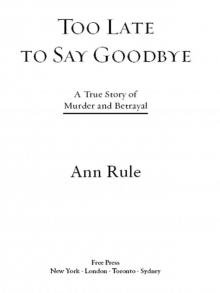 Too Late to Say Goodbye: A True Story of Murder and Betrayal
Too Late to Say Goodbye: A True Story of Murder and Betrayal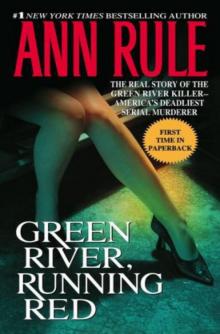 Green River, Running Red
Green River, Running Red Bitter Harvest
Bitter Harvest Dead by Sunset: Perfect Husband, Perfect Killer?
Dead by Sunset: Perfect Husband, Perfect Killer?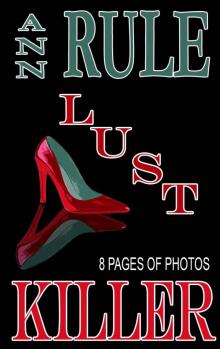 Lust Killer
Lust Killer And Never Let Her Go: Thomas Capano: The Deadly Seducer
And Never Let Her Go: Thomas Capano: The Deadly Seducer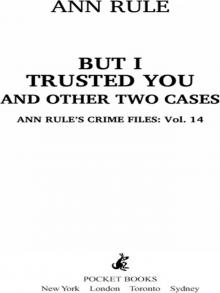 But I Trusted You and Other True Cases
But I Trusted You and Other True Cases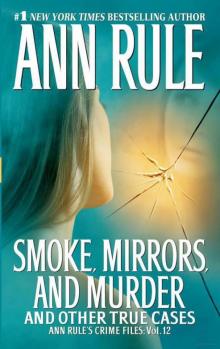 Smoke, Mirrors, and Murder and Other True Cases
Smoke, Mirrors, and Murder and Other True Cases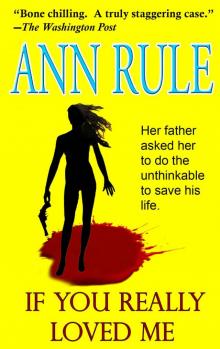 If You Really Loved Me
If You Really Loved Me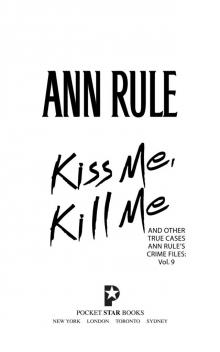 Kiss Me, Kill Me and Other True Cases
Kiss Me, Kill Me and Other True Cases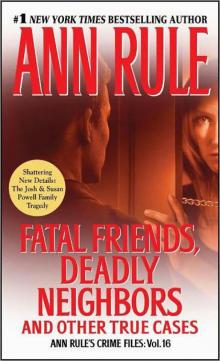 Fatal Friends, Deadly Neighbors and Other True Cases
Fatal Friends, Deadly Neighbors and Other True Cases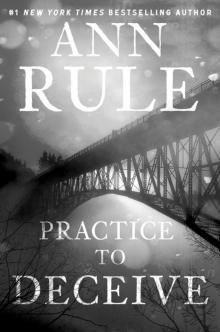 Practice to Deceive
Practice to Deceive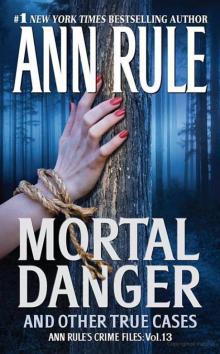 Mortal Danger and Other True Cases
Mortal Danger and Other True Cases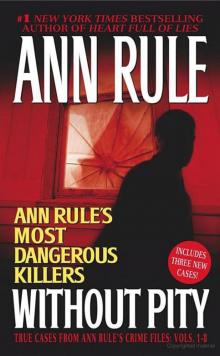 Without Pity: Ann Rule's Most Dangerous Killers
Without Pity: Ann Rule's Most Dangerous Killers Everything She Ever Wanted
Everything She Ever Wanted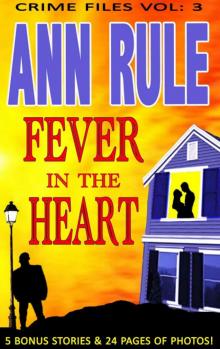 A Fever in the Heart and Other True Cases
A Fever in the Heart and Other True Cases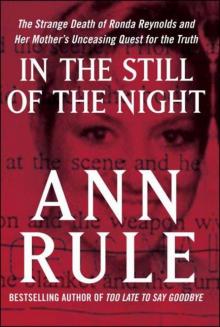 In the Still of the Night
In the Still of the Night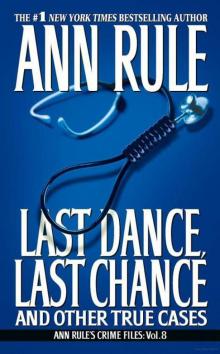 LAST DANCE, LAST CHANCE - and Other True Cases
LAST DANCE, LAST CHANCE - and Other True Cases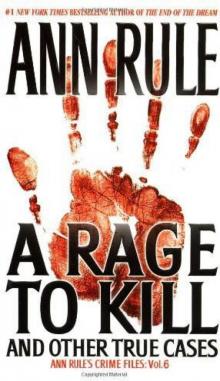 A Rage to Kill
A Rage to Kill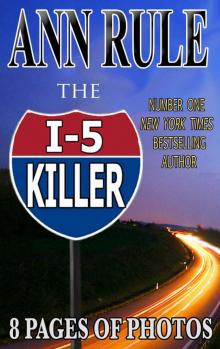 The I-5 Killer
The I-5 Killer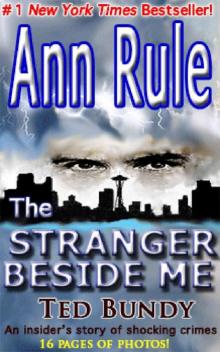 The Stranger Beside Me
The Stranger Beside Me Everything She Ever Wanted: A True Story of Obsessive Love, Murder, and Betrayal
Everything She Ever Wanted: A True Story of Obsessive Love, Murder, and Betrayal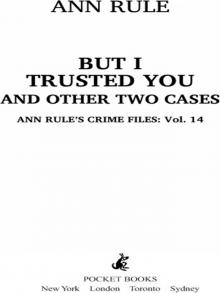 But I Trusted You
But I Trusted You Without Pity
Without Pity Kiss Me, Kill Me
Kiss Me, Kill Me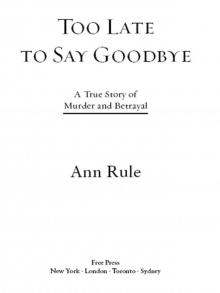 Too Late to Say Goodbye
Too Late to Say Goodbye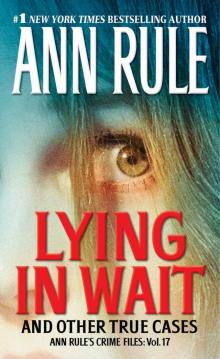 Lying in Wait
Lying in Wait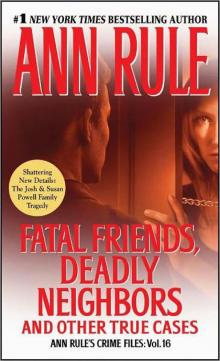 Fatal Friends, Deadly Neighbors
Fatal Friends, Deadly Neighbors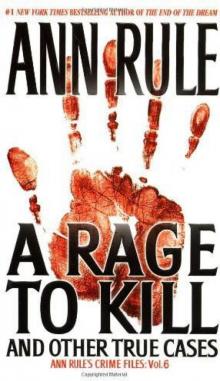 A Rage to Kill: And Other True Cases
A Rage to Kill: And Other True Cases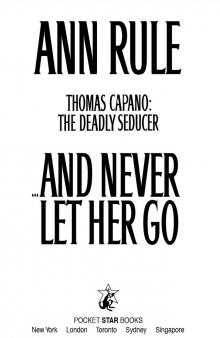 And Never Let Her Go
And Never Let Her Go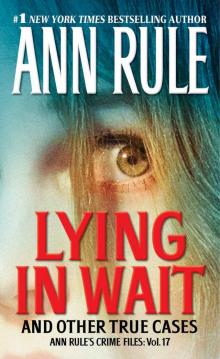 Lying in Wait Ann Rule's Crime Files Vol.17
Lying in Wait Ann Rule's Crime Files Vol.17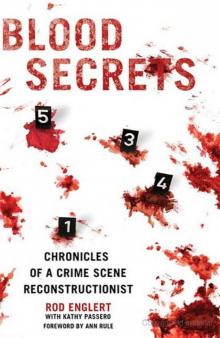 Blood Secrets: Chronicles of a Crime Scene Reconstructionist
Blood Secrets: Chronicles of a Crime Scene Reconstructionist No Regrets
No Regrets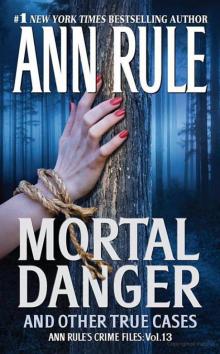 Mortal Danger
Mortal Danger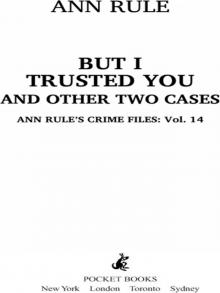 But I Trusted You: Ann Rule's Crime Files #14
But I Trusted You: Ann Rule's Crime Files #14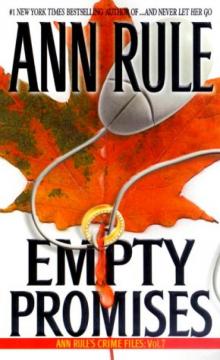 Empty Promises
Empty Promises Dead by Sunset
Dead by Sunset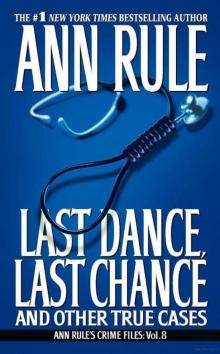 Last Dance, Last Chance
Last Dance, Last Chance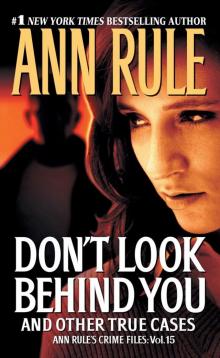 Don't Look Behind You
Don't Look Behind You